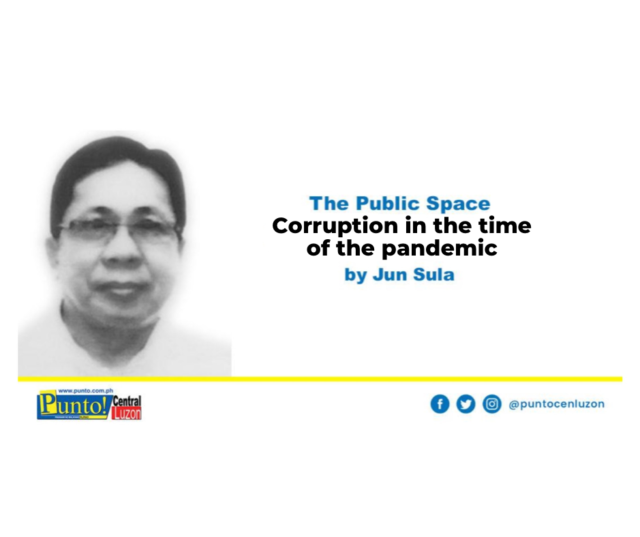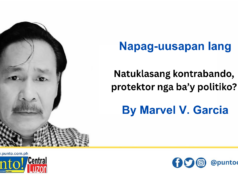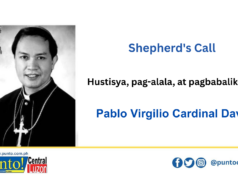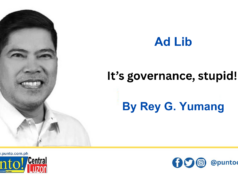IN “East of Eden”, Nobel Prize winner John Steinbeck wove into fictional narrative what seemed like a sad real-life situation in America sometime before World War I.
Great public thieves came along, he wrote, who picked everyone who had a pocket.
His poignant description of a bygone era is reminiscent of a characterization of a “sick” period in Philippine political history during martial law as seen by a Cebuano politician.
He used KKK, Andres Bonifacio’s famous alphabet soup, to define the evil of the time in stark terms and in the Bisayan language. ‘Kawat dinhi, kawat didto, kawat kanunay’. (Thievery here, thievery there, thievery everywhere).
It wasn’t the autumn of Philippine dictatorship yet under Ferdinand Marcos regime, more like the summer of it that would eventually lead to the Filipinos’ winter of discontent. EDSA Revolution would soon be its dramatic denouement.
Corruption, once again, appears to overwhelm or have overwhelmed ‘the ethical and good governance system of the country with the creation of a body to probe at least five government agencies.
It’s not just the garden variety type of a body but a super agency to look into shenanigans in major agencies under the Office of the President, namely Philhealth, Department of Public Works and Highways, Bureau of Internal Revenue, Bureau of Customs and Land Registration Authority.
Curiously left out is the Bureau of Immigration where about 44 personnel have been suspended in view of the so-called “pastilas” scheme that is estimated to hav e illegally collected some 40 billion pesos from Chinese visitors through the Visa Upon Arrival system. A security guard worth more than 10 million in assets is the bureau’s iconic figure at the moment.
The head of the bureau, of course, is a Duterte appointee who, presumably is pure as Ceazar’s wife.
The humongous corruption is taking place in our midst when most people are reeling under the onslaught of the pandemic. It is happening despite Duterte’s campaign promise to rid government of corrupt people, whether they are his or not. It’s counterintuitive to think of the latter.
This current greater effort against corruption in government somehow becomes risible, if not oxymoronic, for several reasons.
For one, the President himself has premptively absolved or excluded his appointees in the proposed investigation, like Public Works Secretary Mark Villar and Health Secretary Francisco Duque.
Rich people don’t engage in corruption activities, explained the President by way of his ever-loquacious spokesperson. Villar and Duque are rich people, ergo, they don’t steal.
This official view flies in the face of facts established by separate investigations of the House of Representatives and the Senate that wanted Duque, at least, to be made accountable for the Philhealth mess.
The Ombudsman, for suspicious reason, has banned the issuance of the SALNs of public officials and a lifestyle check on them. The Ombudsman, another Duterte pick, has invoked Duterte’s doctrine that these are being weaponized against public officials.
So far, the only public official put in jail because of alleged corruption belongs to the opposition: Sen Leila de Lima. And the latest report is that no less than the government’s witnesses have declared her basically innocent of the charges, trumped-up it really shows now.
The Supreme Court, which has bailed out the likes of former President Gloria Macapagal Arroyo and former Senator Juan PonceEnrile, doesn’ t look to be interested in De Lima’s case. In any case, it remains quiet and deliberate in its ways while vital issues relative to freedom, democracy and public order are brought to its doorsteps.
A long time ago, the late Senator Miriam Defensor Santiago called out a Philippine bully of a neighbor as the provenance of corruption. Santiago’s accusation might have been short of facts and fairness, given what’s Transparency International has found out.
TI profiling of corruption 180 countries of the world placed that country, along with the United States, Spain and Japan,better off in fighting corruption in their societies. They’re anywhere from 20 to 80 in the ranking. The Philippines is ranked 113th in the list. The further a country goes down in ranking, the worst off it gets.
There’s a crocodile in every swamp, according to a Tausug saying.
So our size, shape and form of corruption is endemic, or homegrown, if you will.
The five government agencies targeted by the new superbody for investigation are the swamps that needed to be drained of crocodiles, although some crocodiles are said to inhabit other branches of the government, like former Alan Peter Cayetano’s lost kingdom. And don’t look now, corruption charges are up against those behind the holding of the ASEAN games in Clark. Some skeletons in the closet may be rattling.
Even local governments are likely inhabited by public thieves who have used pandemic as a convenient, even perfect, cover for picking people’s pocket. At least one in Pampanga has been haled before the Ombudsman with his hand in alleged overpriced cookies.
The old cliche that only two things are certain in this life, tax and death, may have to be revisited. It’s obviously incomplete. Corruption must be added to this rusted truism.
Corruption is a cancer that eats away people’s faith in democracy, U.S. leading presidential candidate Joe Biden has said. Even authoritarianism or dictatorship, which experts say have become stronger in this pandemic time, are not immune from it.
The Philippines is a case in point. Add China and Russia in the mix, too. The fault is not in our stars, dear Brutus, Cassius said, but in ourselves. Corruption did the Roman Empire in. In the meantime, the Philippines which ranked second to Japan before Marcos took over, has been overtaken by Vietnam and other Asean neighbors, most likely because of corruption.
Corruption is paid by the poor, Pope Francis remarked once. In a country like the Philippines and at a time of the pandemic where millions have lost jobs and livelihood, those who are at the bottom of society’s pyramid bear the greatest burden.
Don’t hold your breath now in light of the ongoing frenzy over corruption in government. It’s too early to tell and too good to be true.





